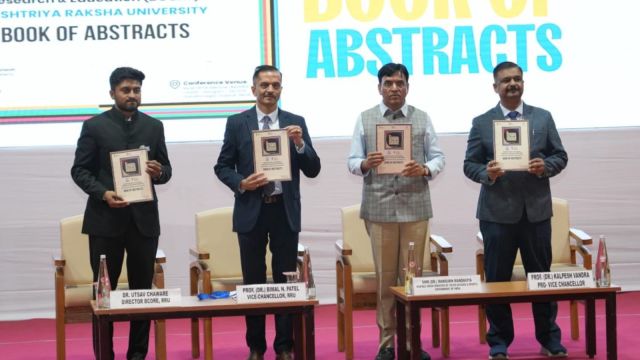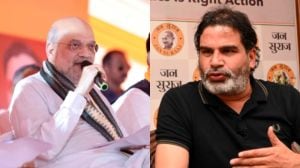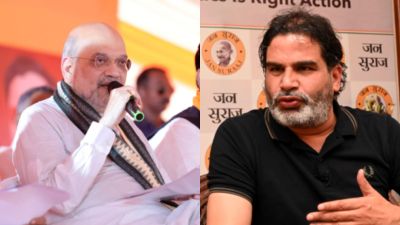Sustainability and planning in focus, four-day conference kicks off in Ahmedabad to discuss India’s Olympic-readiness
At the event, Dr Thomas Bach, President of the International Olympic Committee (IOC), conveyed his virtual message emphasising the integration of sports and education to create a holistic approach to youth development and nation-building.
 Harsh Sanghavi, the State Minister of Sports, highlighted Gujarat's grassroots sports initiatives, particularly the “record-breaking participation” in the Khel Mahakumbh earlier this month (Express)
Harsh Sanghavi, the State Minister of Sports, highlighted Gujarat's grassroots sports initiatives, particularly the “record-breaking participation” in the Khel Mahakumbh earlier this month (Express)Reiterating the goals set by Prime Minister Narendra Modi for the country in the field of sports, Mansukh Mandaviya, the Union Minister of Youth Affairs and Sports, on Monday stated that the aim was to become among the top 10 ranking nations by 2036 and top five by 2047.
Addressing the inauguration of the first international Olympic research conference organised by the Indian Olympic Association at Rashtriya Raksha University (RRU) Gandhinagar, Mandaviya highlighted India’s growing commitment to the “Olympic Movement”.
He further underscored the role of RRU’s BCORE (Bharat Centre of Olympic Research and Education) or “Bharat Core” in India’s Olympic journey and stressed on the importance of aligning it with India’s goal of becoming a developed nation by 2027. He highlighted initiatives like Khelo India and the Fit India movement, which have “fostered grassroots sports development, inspired active lifestyles among the youth, and contributed to building a productive and healthy society”.
At the event, Dr Thomas Bach, President of the International Olympic Committee (IOC), conveyed his virtual message emphasising the integration of sports and education to create a holistic approach to youth development and nation-building. The four-day conference aims to establish India as a significant player in the global Olympic ecosystem, focussing on financial sustainability, strategic planning and collaborative networks to bolster India’s bid for the 2036 Olympics.
The inauguration was followed by a panel discussion, which saw the presence of, besides Mandaviya, Utsav Chaware, Director of BCORE; Prof Bimal N Patel, Vice Chancellor, RRU; Prof Kalpesh H Wandra, Pro V-C, RRU; Prasanth Shanthakumaran, Partner, KPMG in India; and Lambis Konstantinidis, Executive Director of Planning and Coordination for Paris 2024 Olympics.
Konstantinidis highlighted the critical aspects that India must address, including sustainability, technical planning, and creating a compelling narrative that showcases India’s uniqueness and readiness to host the Games. “The key thing that you need to keep in mind is that the Olympic and the Paralympic games, which India will be bidding to host, is a huge opportunity for your country. It is a huge responsibility, and the responsibility lies in the fact that the Olympic games are a step in the long-term process,” Konstantinidis said.
“If we consider the Olympic Games as a one-off event that is being organised just to celebrate sport, and then we move on to something else, it is a missed opportunity. The countries that have most benefited from hosting the Olympic and the paralympic Games are those that have demonstrated a long-term strategy to build the sport infrastructure, to build the sports system and to promote the well being of the nation, and of course, to use the energy of the Olympic Games to change mentalities, to become better in terms of urban planning, to become better in terms of sustainability,” Konstantinidis added.
Harsh Sanghavi, the State Minister of Sports, highlighted Gujarat’s grassroots sports initiatives, particularly the “record-breaking participation” in the Khel Mahakumbh earlier this month.
“Gujarat is known as a manufacturing hub and a state of entrepreneurs. It was due to then Chief Minister Narendra Modi’s vision that Khel Mahakumbh started in 2010. Thousands of villages participated in the sports event. In 2025, a participation of 71 lakh individuals is a huge achievement. All these (the participants) may not be state- or national-level players, but a small change in the thought process has been created,” Sanghavi said.
Shanthakumaran of KPMG explained the IOC approach towards the Olympics, adding that by March 2026, things would be clear for India. “From putting the expression of interest, which is a document as to how they are going to do it, to infrastructure, planning, sustainability and security, all of this will be put together before the IOC. This would be followed by a targeted dialogue that would probably be with one or two countries, which is a more consultative approach that IOC is adopting right now. It is to help the country project or plug loopholes in terms of security or infrastructure or any other concern,” Shanthakumaran said. “And finally, if things go right by March or April 2026, you would be declared as one of these countries to host the Olympics. So today, they have given the freedom that it can be a country, a city, or multiple cities. For example, it can be Ahmedabad (for one event), it can be Odisha for another,” Shanthakumaran added.
“There is one more complexity — the IOC is going through its own election. So, there will be a new IOC head that will have its implication in terms of how things are perceived,” he said.







